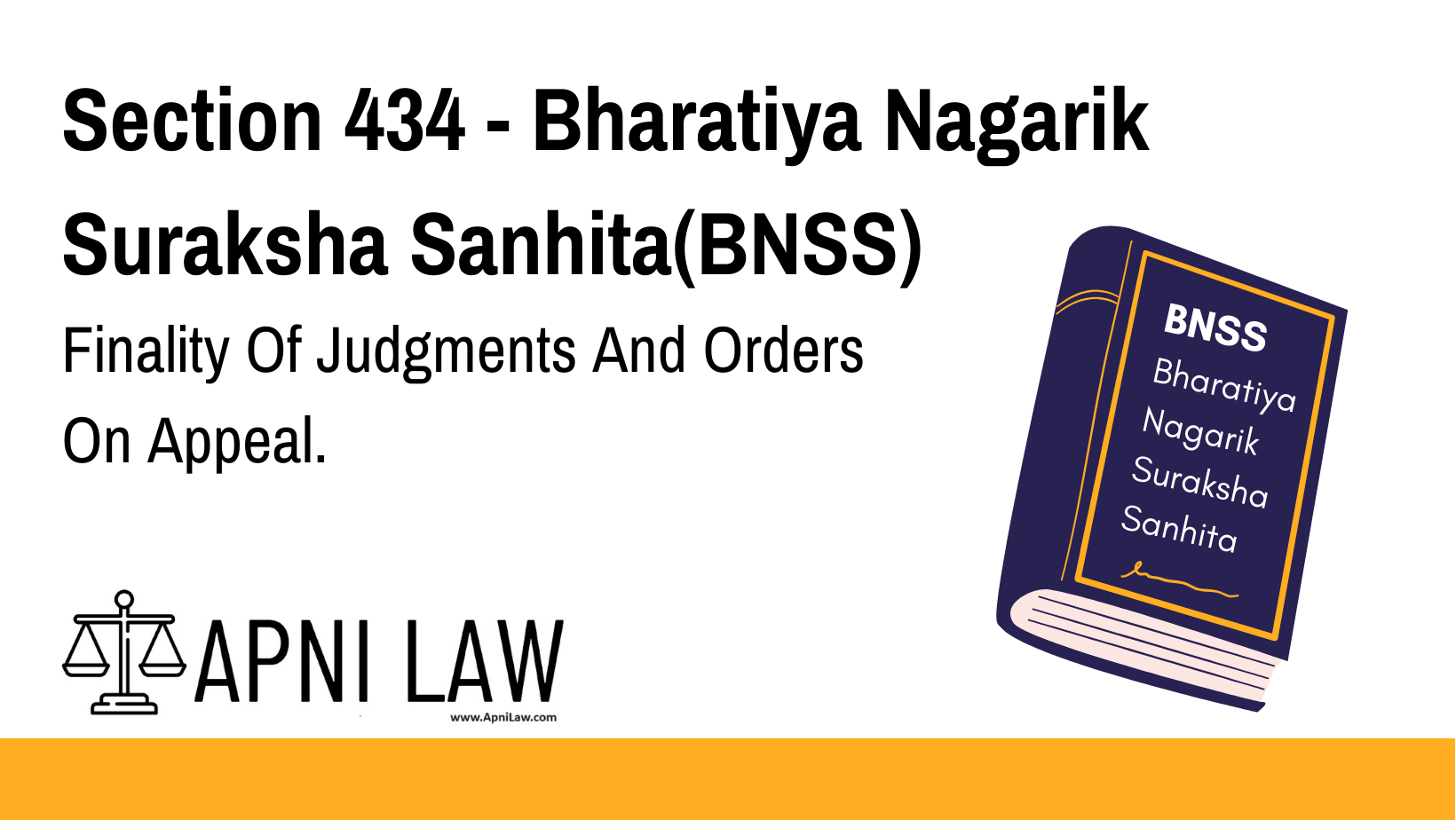Code: Section 434 BNSS
Section 434
Judgments and orders passed by an Appellate Court upon an appeal shall be
- final, except in the cases provided for in section 418, section 419, sub-section (4) of section 425 or Chapter XXXII:
Provided that notwithstanding the final disposal of an appeal against conviction in any case, the Appellate Court may hear and dispose of, on the merits,—
(a) an appeal against acquittal under section 419, arising out of the same case; or
(b) an appeal for the enhancement of sentence under section 418, arising out of the same case.
Explanation of Section 434 BNSS
Section 434 establishes the finality of judgments and orders passed by an Appellate Court after hearing an appeal. This means that once the Appellate Court has made its decision, the judgment or order is generally final, and no further appeals can be made. However, there are specific exceptions, as outlined in other sections of the BNSS, where the finality can be challenged or reconsidered. These exceptions are:
- Exceptions to Finality:
- Section 418: Appeal for enhancement of sentence.
- Section 419: Appeal against acquittal.
- Section 425(4): Specific provisions regarding cases under Chapter XXXII.
- Appellate Court’s Power to Reconsider:
- Even after an appeal against conviction is disposed of, the Appellate Court can still hear and decide:
- Appeal Against Acquittal: If the acquittal arises from the same case, it can still be reviewed.
- Appeal for Enhancement of Sentence: If the appeal for increasing the sentence arises from the same case, it can still be heard and decided on the merits.
- Even after an appeal against conviction is disposed of, the Appellate Court can still hear and decide:
Illustration
Example 1: Finality of Judgment
A High Court passes a final judgment on an appeal regarding the conviction of an accused. As per Section 434, the decision made by the Appellate Court is final and cannot be appealed further, except in the cases mentioned in Sections 418, 419, and others.
Example 2: Appeal Against Acquittal
Suppose a person is acquitted by the trial court, and an appeal is made against this acquittal. Under Section 434, even after the original conviction appeal is disposed of, the Appellate Court may still hear and decide the appeal against acquittal if it arises from the same case.
Example 3: Appeal for Enhancement of Sentence
In a case where an accused is convicted and sentenced, the Appellate Court may dispose of the appeal. However, if the appeal was about enhancing the sentence, the Appellate Court can hear the merits of the enhancement appeal and make its decision accordingly.
Common Questions and Answers on Section 434 BNSS
1. Are all judgments by the Appellate Court final?
- Answer: Generally, yes. The judgments and orders passed by an Appellate Court are final, except in specific cases outlined in Sections 418, 419, 425(4), or Chapter XXXII.
2. Can the Appellate Court still hear an appeal after finalizing the conviction appeal?
- Answer: Yes, even if the appeal against conviction is final, the Appellate Court can still hear and dispose of an appeal against acquittal or for enhancing the sentence, if they arise from the same case.
3. What are the exceptions to the finality of a judgment?
- Answer: The exceptions to the finality of a judgment include appeals for the enhancement of sentence (Section 418), appeals against acquittal (Section 419), and specific provisions under Section 425(4) and Chapter XXXII.
Conclusion
Section 434 of the BNSS ensures that, as a general rule, the decisions of the Appellate Court are final. However, the law provides certain exceptions where the Appellate Court can still review specific aspects of the case, such as appeals for sentence enhancement or against acquittal, as long as they arise from the same case. This balance helps maintain the finality of judgments while also allowing for necessary revisions or reconsiderations where justice demands it.











